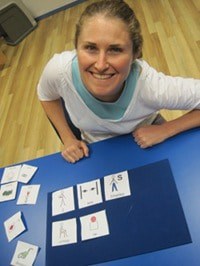Special Educational Needs Teachers work with children and adults who have sensory, behavioural or mental disabilities.
They may also work with extremely gifted individuals.
A special educational needs teacher is trained to work exclusively with people who would be unable to progress in a normal school class environment.
They work with children and adults with a range of problems such as autism, dyslexia, hyperactivity and blindness.
As such, the methods used to convey national curriculum subjects are markedly different to those used in a normal school, involving role-play, touch, sign-language, braille and a host of other special teaching methods.
The goals set for each individual student differ greatly, as do the methods used to engage them in learning.
Salary
- A newly trained special educational needs teacher in the UK has a starting salary of between £20,000 and £25,000 per annum, depending on location,
- An experienced special educational needs teacher can earn between £25,000 and £35,000 per annum.
- A special educational needs teacher at the top of the pay scale can earn up to £42,000 per annum.
Special educational needs teachers are awarded an extra yearly allowance on top of the basic salary paid to normal teachers.
Responsibilities
A special educational needs teacher’s daily activities may include any of the following:
- Preparing lessons and teaching resources
- Devising innovative ways to communicate national curriculum subjects to students
- Using specialist techniques such as braille, sign language and audio visual equipment
- Taking students on field trips and off-site activities
- Liaising with other service providers such as social workers, physiotherapists and psychologists
- Liaising with parents and other teachers
- Attending regular meetings
- Recording and monitoring students’ progress
- Marking submitted work
- Assisting students with severe medical problems
- Undertaking on-going specialist training
Qualifications
A special educational needs teacher needs to first train as a school teacher.
For more information regarding the qualifications needed see our job profile on school teacher.
Once qualified as a teacher, specialist courses need to be taken in order to be able to teach students with different needs.
For example to teach deaf children sign-language is needed, braille is necessary for the severely visually impaired and different courses are aimed at those with multiple sensory impairments.
Many universities offer these courses as post-graduate or masters’ degrees.
Other times LEAs (Local Education Authorities) will offer in-service training to existing teachers.
Check with your LEA for their exact requirements.
Skills
A special educational needs teacher is a unique and demanding job.
The following personal characteristics would be an advantage:
- A caring and patient manner
- A genuine desire to help those less fortunate
- Creative flair and energy
- The ability to deal with challenging situations and individuals
- A great sense of humour
- The ability to motivate and encourage a range of individuals
- A hands-on approach to teaching and personal interaction
Working Conditions

Special educational needs teachers usually work within a specialist school, in a classroom environment although they may work with students in normal schools assisting them personally, in youth offender centres, or hospital schools.
The hours are standard class times, usually 8am till 4pm from Monday to Friday with some extra hours required for marking.
Field trips and extra curricular activities can take place at the weekends, and these are usually organised with the help of parents or other carers.
Being a special educational needs teacher is a physically and emotionally demanding job.
The needs of many pupils are often severe, requiring constant attention and the atmosphere in a classroom is vibrant and often unpredictable.
However, the emotional response from otherwise disadvantaged students and their tangible progress makes it an immensely engaging job that is often more stimulating and rewarding for the capable professional than regular teaching.
Experience
Any experience working with disadvantaged individuals would be useful, so look into charity work and volunteering.
To work as a special needs teacher a certain amount of regular classroom experience must first be obtained.
Some LEAs may also specify a period working as a special educational needs teacher assistant.
Employers
Local Education Authorities hire the majority of special educational needs teachers.
Independent and private schools are responsible for their own recruitment, so contact them directly.
Career Progression

Many special educational needs teachers come from the background of being special educational needs teacher assistants where they can gain a lot of valuable experience.
Training for special educational needs teachers is ongoing and post-graduate degrees can be taken part-time while continuing to work.
This may lead to being able to teach individuals with different types of disabilities and increased earnings as a result.
For accomplished teachers there is the career path to special educational needs coordinator, head teacher or special educational needs consultant (teaching other teachers).
Related Resources
Learning Disability Wales – a national charity representing the learning disability sector in Wales.
Image

Also known as…
- SEN
- Special educational needs teacher
Related Jobs
- Speech & Language Therapist
- School teacher
- Special educational needs teaching assistant
What’s it really like?
Natalie Menser, 30, is a special needs teacher working in Bethnal Green, East London.
How long have you been working as a special needs teacher?
I’ve been at the same school almost five years; I was a mainstream teacher before that in Australia and my role has changed a bit at the school here.
I started off as a cover teacher and worked my way up to a class teacher. I have other roles such as subject leadership and I am the arts coordinator and the design and technology leader; a couple of years ago I became the dance leader too.
I did a BA in Education in Australia and I’ve been doing my Masters in Special Needs education for the last 3 years part-time.
What did you do before this job?
I taught primary children and kindergarten in Australia, up to 10 and 11 year olds for about 18 months.
I came to London as a stop on an around the world ticket, since it was cheaper to come via London to Brazil than direct.
I ended up staying because I really loved the city and the friends I met here.
What do you do in a typical day at work as a special needs teacher?
On a typical day I get to work about 8am and I get the resources ready and plan lessons up till about 9am.
I do anything that needs to be organised or prepared for later in the week before 9am.
Then we have a meeting with the team to make sure everyone is clear about any medical or social issues, which are very common in our children.
Then we set up our first class; the first morning session is tutoring a home group and we focus on the kids’ personal targets there, so that’s quite intense teaching.
After that there’s four sessions where kids go into either ability or subject groups.
Sometimes we go off site, so I take my kids out to community P.E. at different community centres.
Our curriculum is very life-skills based.
Sometimes we have specialists come in and help us; for instance I have a movement therapist who comes in twice a week to help us.
Again the afternoon is dedicated to curriculum subjects such as dance; it’s different every day.
At the close of the day I bring all my class together and we talk about whether we’ve had a nice day or not.
We choose an inspirational piece of music or a video and all watch it together.
After they go home I may need to speak to parents on the phone, have meetings, and take care of paperwork, the assessment and recording of students’ progress.
Each child has four or five personal targets that they are working towards for each year.
These are decided by them, their parents and us so everything we do with them is based around us.
What do you like about working as a special needs teacher?
I can’t sit at a computer all day, so an office job is not for me. I like to move around, I like to interact with people, I like the spontaneity.
We laugh a lot; I don’t mean that we laugh at our children, we laugh together, it’s a really happy place to work.
I think there’s more of an element of creativity in special needs teaching than normal teaching.
We work from a curriculum but you really have to think about how you’re going to get the information across as most of my students have at least one serious sensory awareness impairment.
I have to think about all seven senses.
I love the sensory side of things.
I find it’s getting back to the roots of human development.
For example a lot of my kids communicate in a non-symbolic way, like a little touch or a noise and we have to decode that and translate it to the others.
You really have to think about the stages of human development and place them where they are.
We only have five to seven students per class so it’s a lot more intimate too.
What do you dislike about the job?
I do hate all the paper work because now we are so accountable and we have to have so much on paper that it takes away from our planning and teaching time.
What advice would you give to someone thinking about becoming a special needs teacher?
Do it.
Even just training in it helps your teaching in any area whether you’re working with genius adults or babies. You can apply it to life in general.
What job do you think you might do after this role in terms of career progression?
I have been thinking about moving more into art therapy and education as I’ve been getting into movement therapy.
To be honest, one day I’d like to be a Yoga teacher and own a cafe.
Ha ha! Realistically I might consider consulting, which would be an option if I went back to Australia – teaching teachers.
What other inside-information can you give to help people considering becoming special needs teachers?
I guess, the first day I stepped into my school I went home thinking ‘I can’t do that job’, as it was all so unfamiliar.
But if you stick with it, you soon won’t want to do anything else!
Do you mind us publishing your salary – this is very helpful for job seekers?
My salary that I’m on now is £32,000 per annum.
In special needs you get a few extra allowances on top of the normal teaching salary.
During the day work is intense but I don’t have all the marking of a normal teacher so at least I’m free of that!










